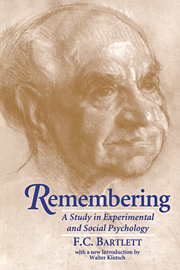Book contents
- Frontmatter
- Contents
- Biography of Sir Frederic C. Bartlett
- Introduction by Walter Kintsch
- Preface
- PART I EXPERIMENTAL STUDIES
- Chapter I Experiment in Psychology
- Chapter II Experiments on Perceiving
- Chapter III Experiments on Imaging
- Chapter IV Experiments on Remembering: (a) The Method of Description
- Chapter V Experiments on Remembering: (b) The Method of Repeated Reproduction
- Chapter VI Experiments on Remembering: (c) The Method of Picture Writing
- Chapter VII Experiments on Remembering: (d) The Method of Serial Reproduction; I
- Chapter VIII Experiments on Remembering: (e) The Method of Serial Reproduction; II. Picture Material
- Chapter IX Perceiving, Recognising, Remembering
- Chapter X A Theory of Remembering
- Chapter XI Images and their Functions
- Chapter XII Meaning
- PART II REMEMBERING AS A STUDY IN SOCIAL PSYCHOLOGY
- Index
- Plate section
Chapter IX - Perceiving, Recognising, Remembering
Published online by Cambridge University Press: 04 August 2010
- Frontmatter
- Contents
- Biography of Sir Frederic C. Bartlett
- Introduction by Walter Kintsch
- Preface
- PART I EXPERIMENTAL STUDIES
- Chapter I Experiment in Psychology
- Chapter II Experiments on Perceiving
- Chapter III Experiments on Imaging
- Chapter IV Experiments on Remembering: (a) The Method of Description
- Chapter V Experiments on Remembering: (b) The Method of Repeated Reproduction
- Chapter VI Experiments on Remembering: (c) The Method of Picture Writing
- Chapter VII Experiments on Remembering: (d) The Method of Serial Reproduction; I
- Chapter VIII Experiments on Remembering: (e) The Method of Serial Reproduction; II. Picture Material
- Chapter IX Perceiving, Recognising, Remembering
- Chapter X A Theory of Remembering
- Chapter XI Images and their Functions
- Chapter XII Meaning
- PART II REMEMBERING AS A STUDY IN SOCIAL PSYCHOLOGY
- Index
- Plate section
Summary
INTRODUCTION
The main data of my experimental studies have now been set forth and it is time to consider whether they have any consistent theoretical significance. As everybody knows, there is no lack of theories of memory. Biologists, philosophers and—though, perhaps, to a smaller extent—psychologists have put forward numerous speculations. Biologists, on the whole, have treated memory mainly as a repetitive function and have speedily become immersed in theories of how specific ‘traces’ maybe made and somehow re-excited. Philosophers have naturally tried to find how what is recalled is related to a ‘real’ world and have discussed the validity of the information that is given by recall. Most of the more careful psychological work, especially that which has an experimental basis, has been concerned with special problems in the general field; for example, with the normal course of learning and forgetting; with the influence of special conditions such as position in a series, intensity of stimulation and the like; with classifications of the typical kinds of association and with a study of ‘association strengths’. Psychopathologists have considered prodigies, whether of remembering or of forgetting, and have given detailed attention to the question of the affective basis of recall. The classical theories have often been adequately summarised and I shall make no attempt to describe them here. More recent general psychological theories are still in a fluid state and no brief summary could do them justice. I shall therefore proceed at once to consider how my own results may lead to theoretical conclusions regarding the characteristics and functions of recall.
- Type
- Chapter
- Information
- RememberingA Study in Experimental and Social Psychology, pp. 186 - 196Publisher: Cambridge University PressPrint publication year: 1995
- 1
- Cited by



